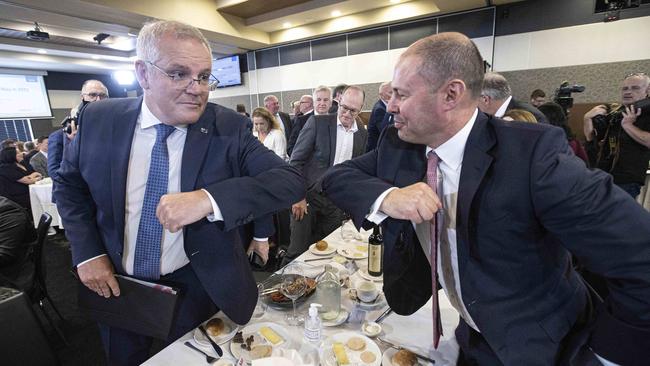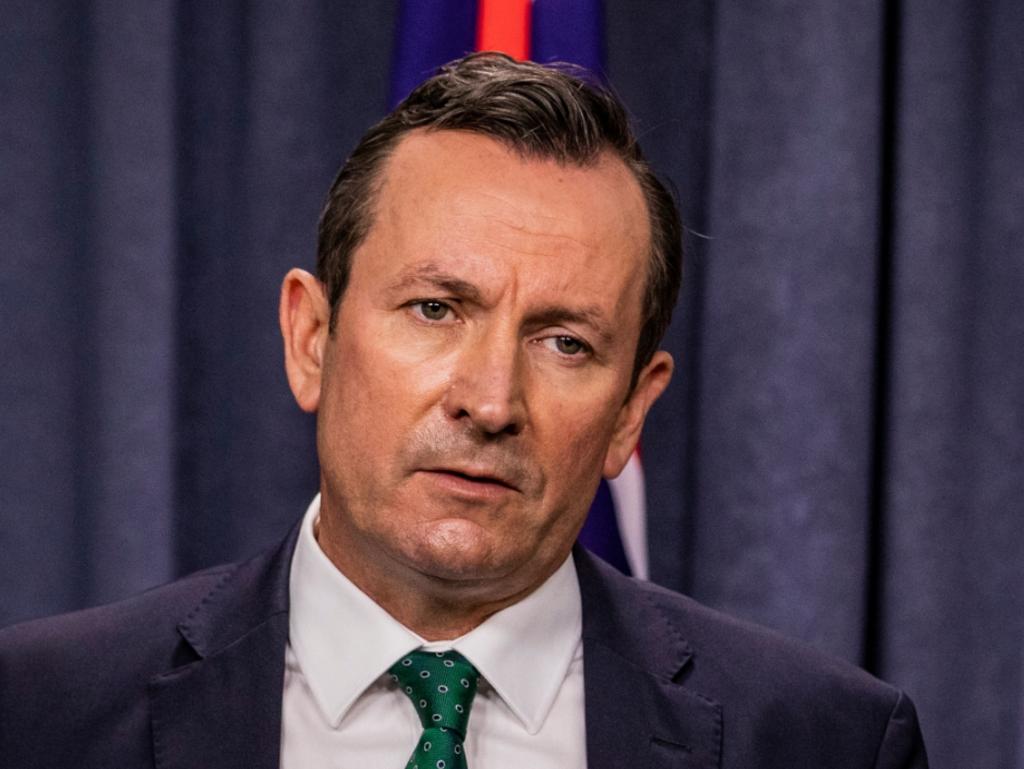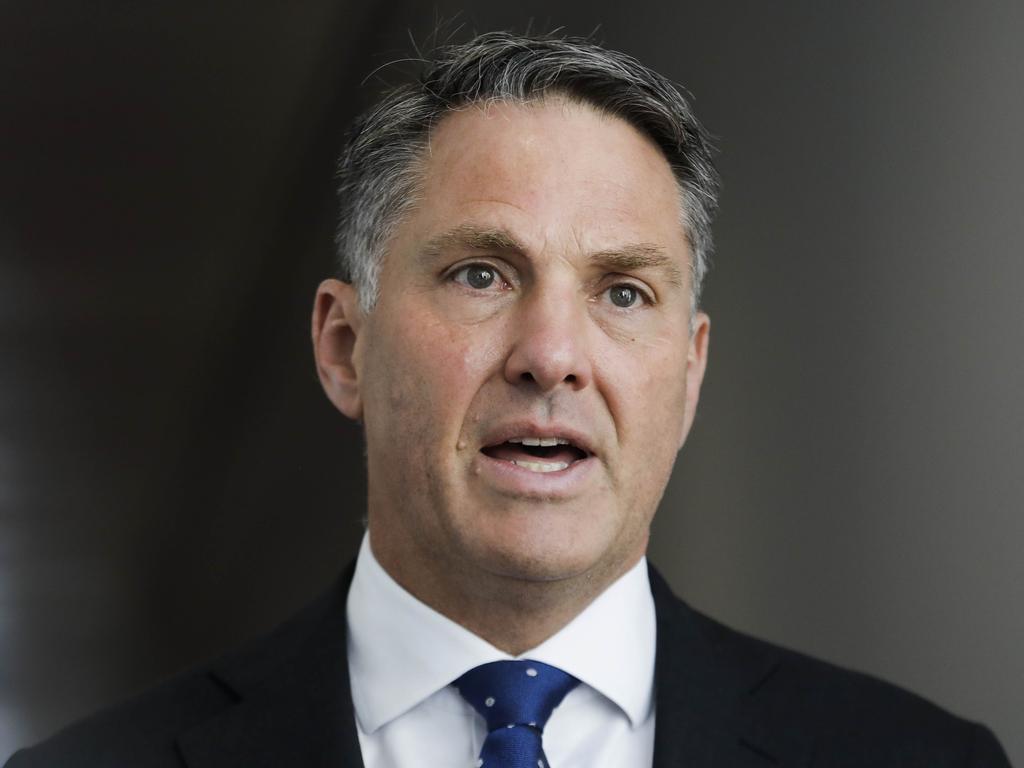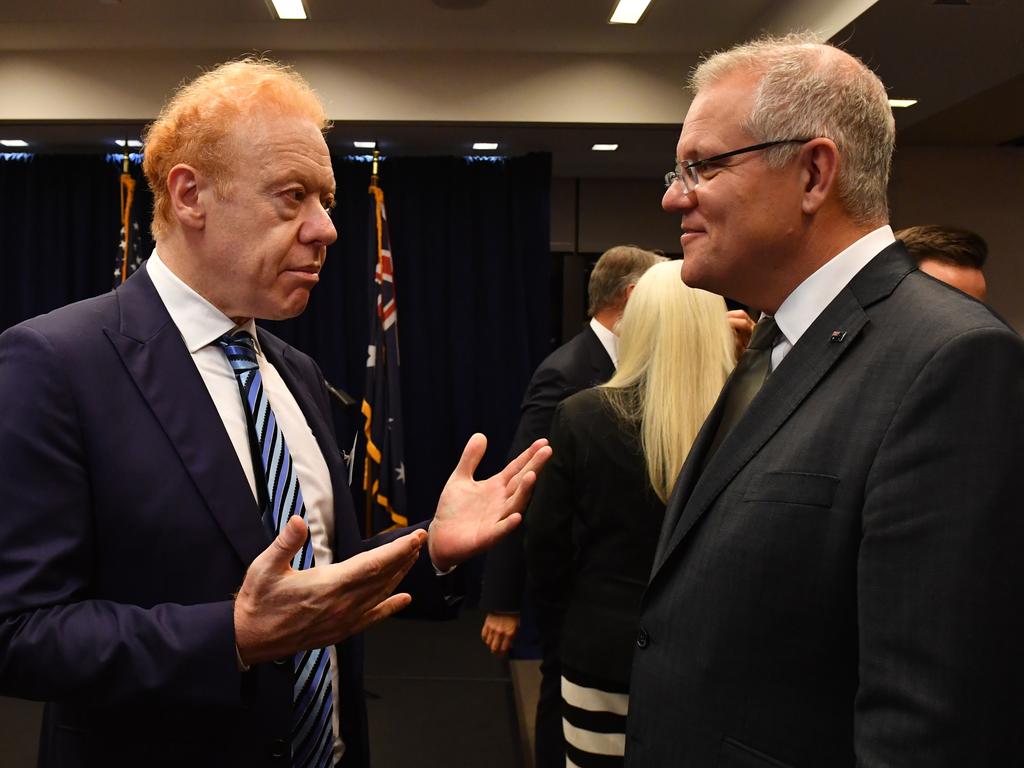No taxes to hit net zero: PM
Scott Morrison says he would like Australia to be carbon neutral by 2050 but will not ‘tax our way’ to the climate target.

Scott Morrison says his goal is to reach net zero carbon emissions as soon as possible, preferably by 2050, but has declared his government will not “tax our way” to the climate target.
Outlining an aim that could inflame divisions within the Coalition, the Prime Minister told the National Press Club on Monday that he would like Australia to be carbon neutral by 2050.
At the heart of the government’s attempt will be new technology and a low hydrogen price, with Mr Morrison warning he will not commit to the 2050 target unless he can outline its impact on the economy and jobs.
Mr Morrison’s speech came one week after he told The Weekend Australian that it was “now about the how, not the if” of reaching net zero emissions by 2050.
“Our goal is to reach net zero emissions as soon as possible, and preferably by 2050,” he told the National Press Club.
“Now is the time to focus on how we’re going to get there. So if we can produce hydrogen … at $2 a kilo, then, we can get there,” Mr Morrison said.
“If we can’t, it’s going to be very hard … they’re the targets I’m interested in, achieving those, because I know they’ll achieve the bigger target, which is where we’re seeking to head.”
An Australian National University report released last year predicted the cost of green hydrogen could hit $2-$3/kg by 2030.
In the headland speech marking the start of a potential election year, Mr Morrison outlined the federal government’s climate change and environment priorities led by its emissions reductions strategies and response to the loss of soil organic carbon.
Facing pressure from Labor, business groups and environmentalists to adopt a net zero emissions target in line with the US, Britain and New Zealand, Mr Morrison said the federal government would pursue carbon neutrality without imposing higher electricity prices and taxes.
“If you don’t get there by technology, if that’s not what actually gets an economy to net zero, there’s only one other way that that’s achieved and that is a tax,” he said. “That’s the only other way you get there.”
Mr Morrison used the speech to outline: the next steps in delivering an industry-targeted COVID-19 economic support program when JobKeeper and JobSeeker coronavirus supplement payments end in March; the importance of the US-Australia alliance; and ongoing challenges in the relationship with China.
Amid clashes between Nationals and Liberal MPs over coal-fired power stations, Mr Morrison said it was possible for Australia to reach net zero emissions sooner than 2050 under the government’s $1.9bn investment package for future technologies to lower emissions, headlined by a $570m investment in hydrogen.
Grattan Institute director Tony Wood warned that the government’s $2/kg price goal for hydrogen would not be low enough for big industrial users to switch from gas.
Mr Wood said the government would need to provide incentives or subsidies for businesses to use hydrogen at $2/kg, declaring that a viable price would be about half of the proposed target.
“The industrial emissions in things like where we use gas for making fertilisers and explosives, areas of cement manufacturing and those things, there does need to be some improvements in technology but even at $2/kg, that won’t be enough to cause people to buy them because that will still be expensive energy,” Mr Wood said.
“Because at $2/kg it is still $16/ gigajoule of energy, and we are complaining about gas at $8/gigajoule. So that is not going to work. I agree with him about the technology that is needed.
“What I disagree is that it will magically be brought down to a point where people can just buy them anywhere. There will have to be some form of carrot or stick to cause people to pay for them.”
Labor’s climate change spokesman Chris Bowen said Mr Morrison was “equivocating” on the “net zero by 2050” target. “It’s a fact that if the government maintains its level of inaction on emissions and there is no commitment to net zero by 2050, our energy supply will continue its unreliability spiral, risking thousands of jobs in traditional industries and manufacturing,” Mr Bowen said.
The government’s emissions reduction strategy is based on hydrogen production under $2/kg, development of carbon capture and storage and long-duration energy-storage technologies, producing low-emissions steel and aluminium and reducing soil carbon measurement.
Mr Morrison referenced comments made by US special presidential envoy for climate John Kerry in defending his government’s pursuit of net zero emissions through science and technology. “He said the US could reduce their emissions to zero tomorrow and it wouldn’t solve the problem. Why? Because all the emissions increases are happening in developing countries. Now, they’re not going to switch off their economies,” Mr Morrison said.
“They’re not going to do it. I tell you why they will do it, in terms of making a change, if there’s commercial technology that enables them to do it. And that’s why we want to partner with them, we want to partner with India on these issues, with Indonesia, with Vietnam. We have got to focus on the how, now.”
Since assuming office last month, Mr Biden has returned the US to the Paris Climate Agreement and committed to a net zero emissions by 2050 target. Mr Morrison said Australia would support Mr Biden’s climate leaders’ summit, slated for April 22, but had not yet received any formal communication from the White House.
Discussions between Energy Minister Angus Taylor and Mr Kerry last month focused on using new technologies to drive down global emissions and support developing nations.
Australia and the US, which have agreed to launch a joint working group, discussed the need to enhance international collaboration on technology research and development to reduce the cost of new technologies and encourage more private sector investment. Australia has signed agreements with Japan, Korea, Germany and Singapore to co-operate in the development of hydrogen supply chains and technologies.
Victoria Energy Policy Centre director Bruce Mountain said Mr Morrison was exaggerating the ability of hydrogen to help Australia reach carbon neutrality. “This $2/kg is kind of a holy grail they put on but frankly it doesn’t mean very much. I don’t think it is plausible to say ‘unless we can get to that we can’t contemplate (zero-net emissions),” Mr Mountain said.







To join the conversation, please log in. Don't have an account? Register
Join the conversation, you are commenting as Logout